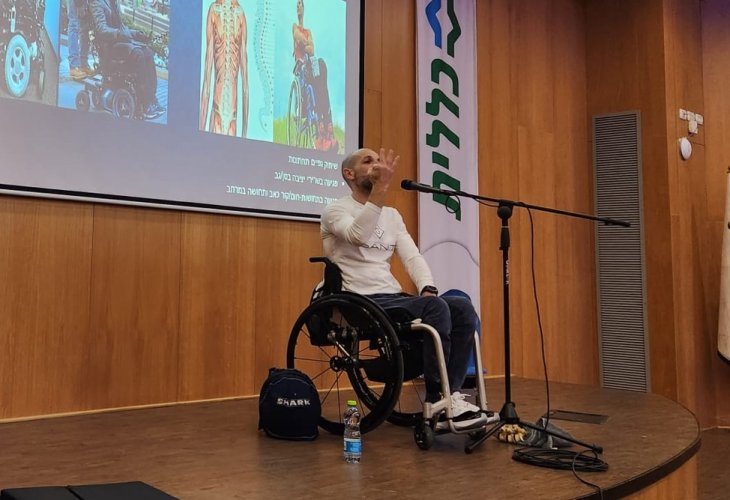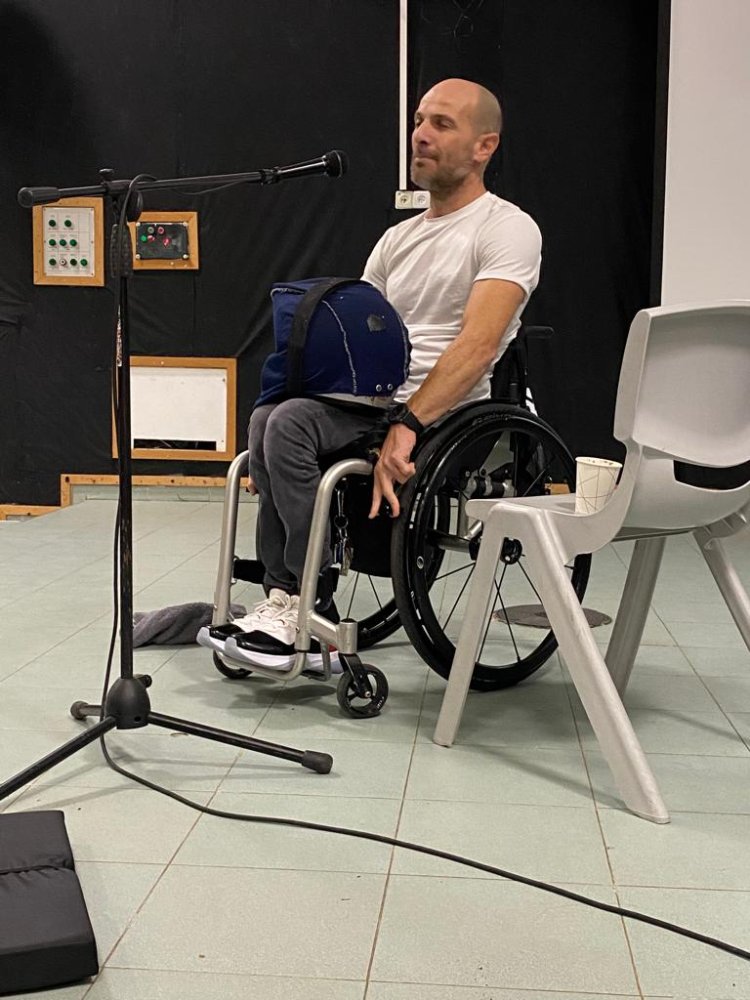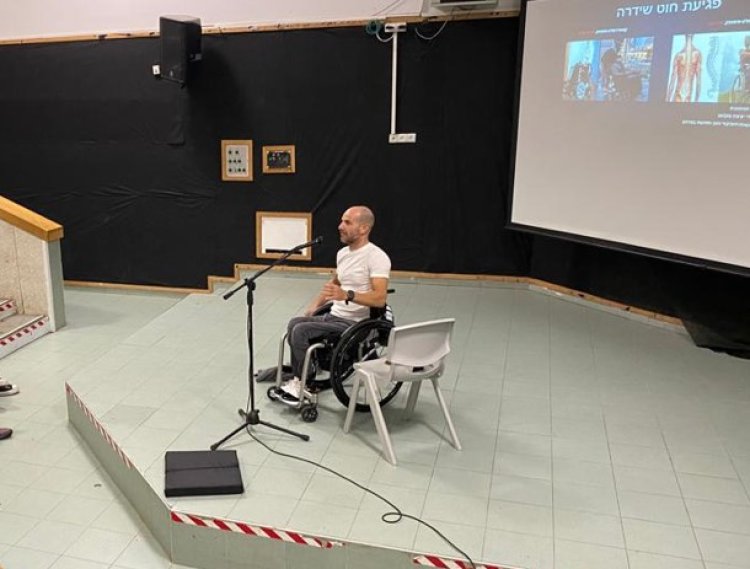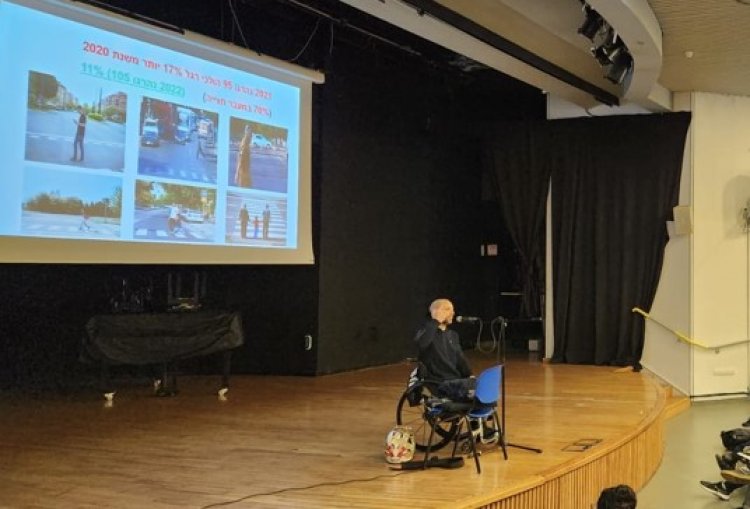"7 Months After My Injury, I Thought I'd Walk Again; Then Came the Big Shock"
What happens to a 20-year-old who experiences a severe road accident and is left disabled? What gives him the strength to live, and how does he find the ability to lecture nationwide from deep within his pain? An inspiring interview with Moshe Tabashi.

"Twenty-five years ago, my life changed," says Moshe Tabashi at the beginning of our conversation and pauses for a long silence. Twenty-five years is undoubtedly a significant amount of time, but apparently not enough to forget what happened before. Tabashi was then a young man, 20 and a half years old, trying to conquer the world with his motorcycle. However, a serious road accident led to a severe spinal cord injury, resulting in paralysis of the body from the waist down.

"I think many people don't understand what 'serious injury' means," he notes, "and in general, those who have not encountered road accidents up close do not understand their implications. People briefly read in the newspaper about someone killed in an accident and see that it mentions a severe injury, but they don’t really understand what that means. In the 'year-end summary' supplement, they read about 360 people killed on the roads, without even mentioning those severely injured and the damage caused to them, their families, and their entire surroundings."
Moshe speaks from painful experience. "I was like that too," he notes, "at 20, I bought a motorcycle and felt like the king of the world, not believing anything could happen to me, and not understanding what a serious injury was. I thought you just break an arm or leg and then recover. I didn't understand what paralysis meant at all."
Choosing Life
Moshe sees it as his mission to expose as many people as possible to the concept of 'road accidents' in all its aspects. "A year and a half after my injury, I started giving lectures, where I first explain what a serious injury is and what it means to be paralyzed and realize you will never stand on your feet again. I add that the injury doesn’t only affect you as a disabled person but also all your friends and family, because everything changes due to the injury. I know many people who lost their friends and even their jobs, some got divorced, and others fell into depression. Coping with disability is very complex.
"Then I go on to tell my personal accident story and the process I went through. Although I don’t remember the accident at all, nor the resuscitations done in intensive care, I remember what happened about seven months after the accident, when the realization suddenly hit me that my injury wouldn’t heal.

"At that time, I was fully conscious, undergoing rehabilitation and physiotherapy, yet I told the doctors, nurses, and everyone around me that I believed if I just exert myself, within a year after release from the hospital, I would walk on my feet. The medical team's approach was not to tell me the whole truth upfront but to let me understand it for myself. And indeed, only after seven months the realization hit me, and it was terrible and shocking. Suddenly I understood that I would leave the hospital healthy but in a wheelchair and not on my feet, and that was a huge shock. After the shock came the sorrow and pain, with lots of crying and collapse. I tried to summon my strength, but I felt that the whole world had stopped. After all, life had changed, nothing remained as it was.
"I was discharged from the hospital at 21 and a half and began to adapt to my new life, which at that stage required assistance in almost every action. My parents cared for me and supported me. I am very grateful to them, but it was incredibly frustrating and painful for all of us, and I couldn’t bear seeing them stop working because of my injury. After six months, I felt I could no longer handle it, so I decided to leave home and took a childhood friend to care for me. It was the right decision because when someone your age cares for you, you can flow more easily and joke around. At the same time, I learned how to get around outside the house and quickly got a license for a disabled vehicle, which greatly eased my travels since I could drive independently all over the country.
"Among the first places I visited was Beit Halochem, where I met IDF disabled veterans and people more experienced in disability than me. I remember looking at them with admiration, being very impressed by all they do. I was a 'beginning disabled person,' and they were capable of going up and down curbs and doing things I could only dream of at that time.
"I started simply learning from them, asking questions, and trying to understand and practice. Gradually and in stages, I felt things were going well, and I managed to do more activities on my own. I even returned to fitness training and sports games. Although I can’t play football, I play basketball regularly and really enjoy it.
"It’s not that there weren’t moments of frustration," he emphasizes, "in those days, I would reach my bed at night and feel the tears coming, but I succeeded in controlling the pain. I decided to choose life."

Don’t Take Risks
One of the things that helped Moshe the most was starting to give lectures in schools and various places about a year after he was discharged from the hospital. "The one who pushed me was a physiotherapist from Tel Hashomer who asked me to accompany him to lectures," he explains. "The physiotherapist delivered the medical knowledge, while I added my personal story as someone injured in a road accident. In those days, I would stand before the audience and simply burst into tears. True, in daily life, I managed to function, and life was even very good, but every time I talked about my disability, it would drag me back into the trauma and make me cry. At some point, I told the physiotherapist that I was unable to lecture anymore; it was too hard. So we agreed that whenever I felt I was almost crying, he would take over the lecture, and so it was.
"Shortly afterward, I became an independent lecturer, and from then until today, for twenty-three years, I have been giving lectures all over the country. Over time I learned to control my emotions and manage to speak to the audience with great emotion but not cross the threshold that makes me cry.
"At the same time, I made the decision that I couldn’t be selfish and see only myself in the picture. It’s unacceptable for the entire environment to perceive me as miserable and pitiful, especially since I’m truly not. I succeeded in leveraging and building myself in other fields as well. I would go out with friends, participate in courses and studies, and most importantly – I started a family, and I have sweet daughters. Today, I can say with complete confidence that I don’t forgo anything; I do everything from the wheelchair. Maybe things take me a bit more time, but I’m just like everyone else.
What is still hard and challenging for you?
He ponders for a moment. "The difficulty lies in having to plan ahead before every place I go to," he finally notes. "For example, I can’t go to a restaurant with two steps at the entrance because it limits me, and there are even offices or event halls I can’t access because they are not accessible.
"Physically, the most disturbing thing is not the inability to move my legs but the lack of sensation. Since my injury is in the spinal cord, there's no feeling in my legs. I don’t feel heat, cold, or pain in them. I miss those sensations.
Does the fact that you are so involved in lectures not fix your own pain?
"Quite the opposite. I feel that by giving lectures, I succeed in getting the pain out of my body, because the takeaway from my lecture is not that I’m pitiful and limited, but that I have won, I have come to terms with my injury, and today I am in a completely different place. And by the way, I get excited at every lecture as if it’s my first time speaking because the very fact that I’m standing before everyone demonstrates that I have the upper hand.
"My greatest satisfaction is when I meet people who stop me and say, 'We heard your lecture years ago, and it hasn’t left us to this day.' It illustrates to me the tremendous power I have and the significant mission I carry. Though no one wishes to be in such a place, knowing there's a purpose in going through all I've experienced is reassuring.
"My message is simple," he emphasizes, "Don’t go on the road unsafely, stay away from motorcycles and dangerous vehicles, and most importantly: let your intellect rule over your emotion, and remember that your life is more important than any outing or pleasure. Just don’t take risks."

